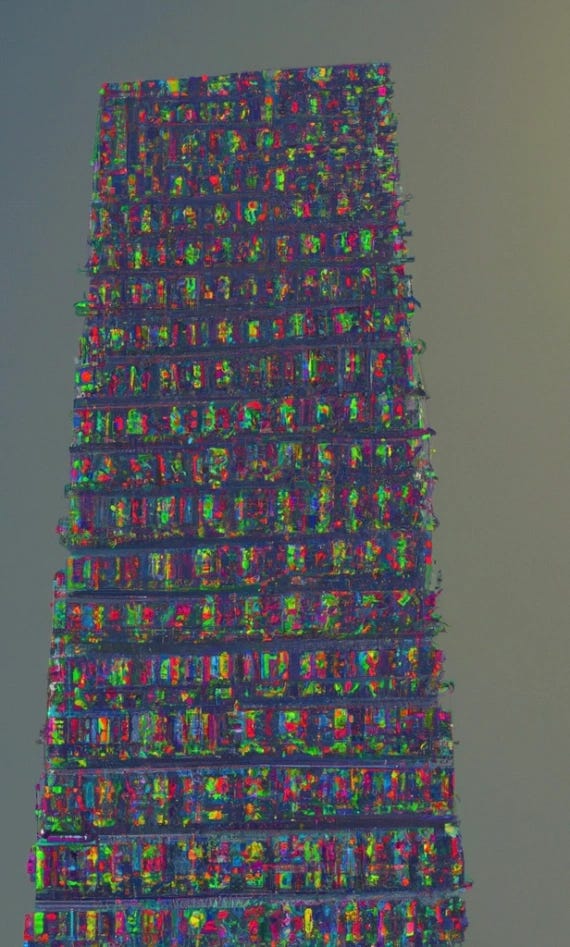Beyond the scope and volume of his own authorial and editorial endeavours, Des Lewis, has been doing yeoman’s work reviewing small press authors and publications for decades. My Time and Propinquity co-editor David Mathew has known Des for some time so I asked him for a little background.
“The first thing that people should know about Des Lewis is some of his publishing history – his apparently indefatigable publishing history. From the mid-1980s to the turn of the millennium, he published (not ‘wrote’: actually published) more than 1000 short stories. (Do we infer a perfect strike rate? Or do we imagine how many more stories were written but not published?)
For the first decade of the new millennium, Des edited and published Nemonymous, a fiction magazine in one of whose editions I am proud to have been included. Stories were submitted, and the lucky ones published, without the author’s name being known. Need it be said that this was more than a simple gimmick? Des had become interested in namelessness – or in the influences that a name might carry – and he had set himself the challenge of finding out to what extent we judge a work if the name is not even available.
The second thing that people should know about Des Lewis: his combined persona of affability and support. Before he retired from his day job […] he told me that he would often write during his lunch breaks, and I asked what his colleagues made of his parallel writing career. Given that by then Des had been approaching the end of his working life, his response surprised me. He made it clear that none of his work colleagues knew anything about his writing. He kept the two spheres of labour apart. Let us also bear in mind that throughout his publishing life, he wrote as D.F. and not as Des Lewis (as far as I’m aware).
Did the move away from the initials and into the more ‘full-frontal’ Des-ness coincide with the man’s resignation from the day job? Quite honestly, I don’t know; I don’t know when he retired. But it cannot be ignored that it is – emphatically – Des who pumps his energy into his Gestalt Real-Time Reviews of Books website (from which so many of us who write in the minor tides have benefited); it is Des on social media, spreading his message of goodwill and support.
His reviews are insightful, daring, caring – full of colour and life. His reactions have encouraged me tremendously – to keep going, to keep pushing, to keep daring – not to mention to keep seeing if I can live up to his expectations. He is tireless in his support of the printed word, whether or not it happens to be a small-press author or someone whose name is much more on a readership’s lips. Long may he continue his campaign of helpful diligence. Before I had even started writing my most recent novel, Abandoned Dental Clinics, and several years before I’d submitted it to Montag, I knew that its dedicatee would be Des Lewis.”
Des’ affirmations have also been quite significant to me. He wrote my first ever review for a short-story I placed in a science fiction journal called M-Brane. Later, his review of I Ain’t Got No Home In This World Anymore made me feel as though my efforts were understood by at least one thoughtful reader.
People often overestimate the esteem and reach of small press authorship. I had a doctor who would repeatedly reference the phantom book tours I was presumed to be on. It’s nice when you’re presumed to be in the same professional class as John Updike or whoever these people have in mind. It’s less nice when the 21-year-old recently published in Mud Hut announces himself as a Writer at the sports bar and who am I to claim I’m somehow more of a writer after reviewing his napkin poems? Small press publishing does come with the esteem of having made your way past a gatekeeper of some stripe, but what doesn’t happen to the extent most authors would like is strangers just finding, and God help us all, actually reading our books. With his voracious reading and reviewing, Des represents the great promise of this happening. The idea that there’s not just someone out there who’ll find it, and read it, but may even get it.
Des now has an interesting project using his reviews to generate AI imagery. As always I am honoured that Des would take the time to (re-)consider my writing.
While several of the images speak to what Des wrote of My New Gang and No Home, others seem eerily predictive of what I’m working on now, works that Des has not read or been informed of in any way. Yes, some themes have carried over, and there is obviously a type of selection bias on my end, but there is a long tradition of reviewers seeing elements of writers’ works that the unwitting writer herself is shocked to realize were there all along. So, as we greet the dawn of a new metacreative fusion of human and machinic intelligence, why not a new tradition, where, aided and abetted by AI, the consummate reviewer might anticipate what a writer might do next.
Here I’ve pasted the images Des generated based upon his previous reviews of my work and provided quotes to illustrate how they reflect projects I didn’t begin until years after those reviews were published.
The central premise of The Introductions is the ontological discontinuity we’ll suffer through once the temporal veil is pierced and nothing can be trusted as new ever again. As the will to technology goes hand in hand with the will to radical life extension, a sub-theme is the diachronic blurring of the self with the other in the hell of eternal prolongation.
Here’s a poem to this effect.
Oh, Autostereogram,
bring your veil of ellision
to the munificence of vision
when the skein of space and time’s
deathless surface gleams
with epiphanic lies.
Thusly séanced,
the depthless offer weave remains
parallactic as the misbegotten real
echoing in Heartland's paean.
Through scrying eyes,
scopic priests seek to find
The hidden weal
magic eyes comprise
in the forgotten relief
of the converged and concealed
come the mourning of friezing time.
Rescind, temporeality, tell the haunting years
how ghosts live on in arrearview mirrors.
Abscond, lensman, with what Kant be place:
Julian’s eleven days lost to latent space.
All of The Introductions foretold here. Arbitrary brain inputs. Cigarette ash in mouth you cannot scream from. One eye looking into a different dimension.
Again. the diachronic blurring of the self with the other eternal prolongation-style, pretty much what I discuss over my Bran Flakes every blessed day. Except the prolongation party is held in a day-glo Tower of Babel, which speaks to the theme of increasingly compromised language in The Introductions. Here’s a ludic example:
Let us remind any non-visible cephalopods or Brain Invaders eager of ARRIVAL that humanity’s linguistic encoding of time as tense and aspect has been, thus far, adaptive. It’s been a good time! The imperfective paradox is no paradox at all. Our temporal logic operators operate just fine, for now. Our ontological primitives bang their bones obscenely as apes pre-thinking before the club, apes stinking Beyond the Infinite, apes on the cusp of a truth they cannot unthrow.
Temba, at rest, there’s Friedlanderian Reason for FEAR long before End Times zombies arrear and re-appear shot-reverse-shot. The signs in PONTYPOOL—an hour northeast of here, east of Uxbridge and Port Perry, north of Orono, north even of Leskar—no longer possess purpose. The needlessly-named bridges are damaged. When bridges fail we plummet into icy depths of semantic darkness. These depths refresh THE SWIMMER capable as Burt Lancaster or bored as THE GRADUATE, though they serve a bitter draught to the sustaining spirit of The Times. The Spirit of the Depths then derides, “You thought you knew this abyss. Oh, you clever people.”
Recognizing we may be losing a lot of people, we asked if MacLeod might take a community college Communications Course, so that we might address audiences in a more populist parlance. Here is the outline for his first assignment:
ASSIGNMENT: Based on Weeks 1 through 7 spent analyzing the Malcom Gladwell essay “The Ketchup Conundrum” elucidate why clear writing is essential to effective essay writing and vital to academic success.
TITLE: Clarity in Writing—Insufficient To, Nay, Incapable of Meaning.
THESIS: N/A. See addendizing protestation of rubric as neoliberal Kafka trap antithetical to its own fetishized porpoises.
BODY PARAGRAPH 1: Heidegger’s mystic word games as (AS!) proleptic ἀλήθεια (aletheia).
BP2: The putative ““ideas”” of Malcolm Gladwell and the late-stage capitalist ““film criticism”” of The Arizona Republic’s Bill Goodykoontz as immanentizers of inanitional eschaton.
BP3: Cut-up poem consisting predominantly (primordially?) of Golden Corral fixins found in Modesto but not Moreno Valley, in Meridian but not Madera, in Minnetonka but not Methuen Town.
BP4: Obfuscation, whimsically-cited sources, and neologorythmic ‘error’ as text’s last dance at a Barthelmean means of “bumping into being.”
CONCLUSION: According to the merits unconcealed in this outline, this essay will not be written or handed in.
Raising a young man to be either an happy and healthy homocyberneticus or at least a favoured party to our Cosmist overlords.
Ten Tips for Reversing the Flow of Time
Caveat emptor—readers must be in hell for these tips to possess value. If not already in hell, readers will have no means of reversing the flow of time. Bad news for the reader not in hell: this list can’t aid you in reversing time. Good news for the reader not in hell: you are not in hell! Readers not in hell are encouraged to count themselves lucky, but also to like and share so that any friends reading from hell might benefit.
One: Request of middle management demons, “Certain to be a common request, Anthony, but mightn’t I be better utilized advancing the infernal cause back on terra firma? No issue with the pencil-sharp penetrations whatsoever, starting to derive an almost pleasant humiliation from them in fact, but I am something of a silver-tongued devil myself, pun intended, Tone, and it seems certain talents of mine, blogging talents, are being underutilized at this level of the organization.”
Two: Be persistent! Don’t think these supervisory demons wouldn’t all like to reverse the flow of time themselves. And regardless of blogging ability, almost everyone considers themselves a silver-tongued devil, hence Twitter, hence the banality of Reddit.com.
Three: Network! Network! Network! People in hell might seem désagréable. And sure you’ll have to hear about their own schemes and dreams for escaping hell, but is the cocktail hour at an insurance convention altogether less dispiriting? It is not. Network until some demonic higher-ups recognize you as a go-getter.
Four: Tip three transcends reversing the flow of time and is relevant to any field.
Five: Keep roars of agony down to dull roars. The insurance adjuster who refuses to spend all his lunchroom hours “bitching and moaning” will be appreciated for his imperviousness to the calling’s crushing mundanity. Similarly, demonic middle management will note your pluck and mention you in Slack threads read by the Archfiend.
Six: When you finally get that meeting with the Archfiend, kiss his pointy toes and offer your orifices to him as sexual chattel, per custom.
Seven: If lying when you plead, “Mr. Infernal Serpent, um, Adversary to most but certainly not to me, you old Son of the Morning you, listen man it’s not about wanting out, it’s about bringing everything we’ve got down here up there,” it won’t matter much; The Archfiend has been lying since he could hold a fiery trident.
Eight: Accept the Archfiend’s offer that you can leave hell on the grounds that you immediately sire a son and teach him the pattern extraction at the bedrock of artificial super intelligence (ASI) engineering, thus instantiating what Destinee has in store for you: “[s]o much positive feedback fast-forward that speed converges with itself on the event horizon of an artificial time-extinction.”
Nine: Have your mission encoded via Neurolinguistic Programming. Feign surprise when NLP guru Richard Bandler is on hand in hell to administer your training module.
Ten: Upon reintegration of corporeal consciousness, remove an intubation or two. Recall the Bandler-recommended books to read to the son you must now sire. Request notepaper from your mother’s purse. Record book titles before they flee your mind as dream-encoded messages flee in the hypnopompic moment:
Python for Dummies
Paradigms of Artificial Intelligence Programming: Case Studies in Common Lisp
R for Data Science
Artificial Intelligence: Foundations of Computational Agents
The entirety of How to Market Your Grief Blog right here, forthcoming from Montag Press in September The lost other not as she is but as she can be recreated with modern witchcraft.
One: Stand in another line. Receive the injection. Watch as your sister receives hers. Notice her hiccupping has stopped. Recognize a second face in her old loved face. Take her hand and realize BPD is not a deficit but a surplus. Love her more than you ever have. In this love know a depth of fear you’ve never conceived possible, a fear of what could happen so soon as the evening: abandonment.
Two: Think of all the friends you once knew. The old gang. Think of how all the books and records of a lifetime could never replace an elaborate handshake developed by a gang of teenage boys. Understand all the love in a life as part of one big chain, every link corroded and breakable by any half-hearted yank.
Three: Hug your sister. Feel the lines that separate you from her blurring. Know that a part of you has been missing for nearly twenty years. Know that she’s back again. Know that she’s only back again for now. Know those old distentio animi blues, meaning time is a dimension of the soul. Ask, “Is this a dream?” Tempt fate a time or two by snapping your fingers and saying, “Wake up.”









